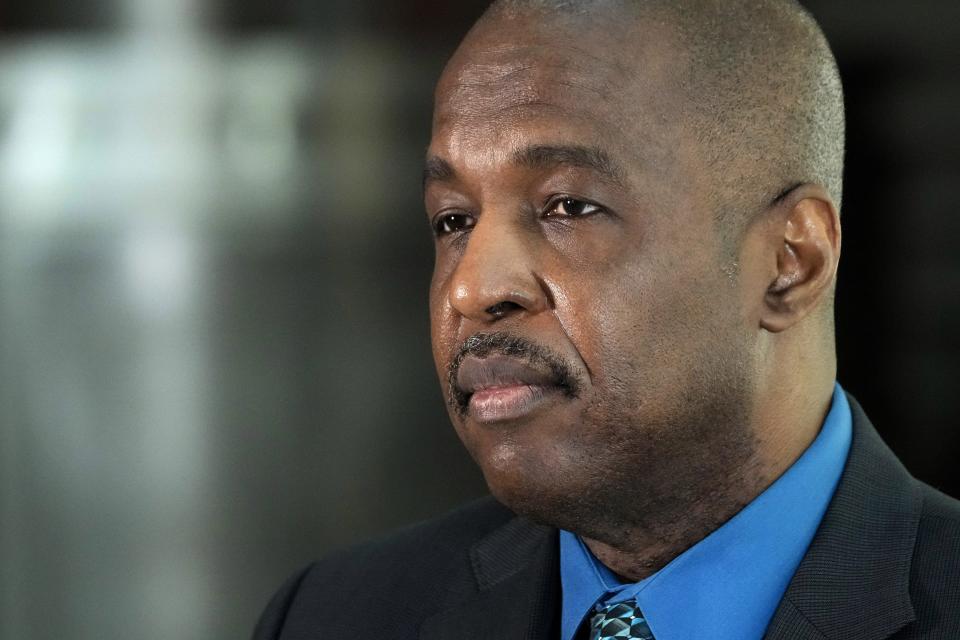The (only) good news in Phoenix police oversight director's abrupt resignation
- Oops!Something went wrong.Please try again later.
A most optimistic take on Roger Smith’s abrupt resignation is Phoenix’s opportunity to advance more smoothly the police oversight office he led.
Smith — whose last day was Friday — had done the heavy lifting, including what turned out to be a more contentious than necessary interpretation of what the Office of Accountability and Transparency (OAT) is permitted to do on reviewing police misconduct investigations.
A contention that got him in the crosshairs of higher-ups.
He also found out the hard way that a job offer and acceptance do not guarantee a hire. At the last minute, the city deemed Smith’s pick for the staff attorney unqualified because of a previous stint she had with Tucson Police, a law enforcement relationship that city code forbids.
Smith's work should help the next director
Smith’s successor won’t face the same challenges. Or need to ramp up the office as he had to.
In his two years at the helm, Smith hired most of the staff of 15, helped set up the expectations of the office that was created mere months before he joined, and began monitoring the investigations of several dozen cases involving use of force and other incidents.
That work should allow the new director of the Office of Accountability and Transparency to hit the ground running, perhaps even before the long-awaited civilian review board that’s part of OAT gets installed.
The relationship between Smith and city leadership unquestionably deteriorated over the last few months. Going from a strong job evaluation he got over the summer to being put on a performance improvement plan in early January underscored that.
Both sides botched his departure

His departure was poorly handled, both by Smith and in the city’s response.
It packed a lot of weight for the person helping to hold police accountable to accuse city leadership of interfering with the office’s independence — at a moment when the Department of Justice is on the verge of releasing its findings into possible constitutional violations by the police department.
Smith’s implication was the city is in cahoots with police and police advocates in stonewalling reform.
Highly charged, that insinuation.
And the city responded by fighting fire with fire.
On top of releasing the evaluation painting him as an unsavvy and “tactless” administrator who didn’t know when to pick his battles, it had its contract attorney fire off a letter to DOJ that painted Smith as a disgruntled employee who tried to overstep his role.
The records provided no foundation to the city's scant portrait of him as an abrasive personality who tried to impose an agenda beyond the scope of the office.
An excessive move by Phoenix to assure the Justice Department that its house is in order by throwing Smith under the bus. After all, the Office of Accountability and Transparency plays neither a role in DOJ’s investigation nor in policymaking and enforcement.
Accountability job changed midstream
Neither party appears wholly sympathetic.
Yet the departure is a needed, if inevitable, outcome.
Smith was hired when the office was contemplated as a true civilian oversight entity, one with independent powers to investigate police misconduct and to recommend discipline.
His previous role, in Cleveland, was with such an entity, and he clashed with the police chief there on occasion regarding who should have been disciplined and the severity of the discipline.
Then in the summer of 2022, less than a year into the job, the Arizona Legislature took aim at OAT and passed legislation that gutted its authority.
The law requires any disciplinary board with powers like OAT to be staffed predominately by certified law enforcement personnel from the same agency it oversees.
Smith quit. Phoenix said 'good riddance'
It’s certainly plausible that Smith “chafed” at the new law, as Phoenix’s outside counsel asserts — he denies it.
And there were times when Smith felt his office’s work was being micromanaged by city leadership that were highly sensitive to how Phoenix is viewed.
He cited, as an example, a report summarizing the number of police shootings that included a mention of how many shootings that worked out to per week. He said he was instructed to strike the clause.
The 11th-hour denial of his pick for staff attorney proved to be the final straw.
On the latter controversy, both Smith and the city have reasonable arguments over whether Catherine Bowman’s volunteer work with Tucson Police qualified her as an employee of that department — he believes it doesn’t, the city contends it does.
Regardless, things soured sufficiently for Smith to call it quits. And an unsupportive city management retorted “good riddance.”
A new beginning for both is about as good as it gets. And for the next director of OAT, that means a job that won’t change midstream.
Reach Abe Kwok at akwok@azcentral.com. On X, formerly Twitter: @abekwok.
This article originally appeared on Arizona Republic: Phoenix can handle police oversight better after leader's botched exit

